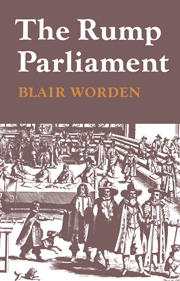Book contents
- Frontmatter
- Contents
- Dedication
- Acknowledgements
- Author's Note
- List of abbreviations
- Introduction
- PART ONE THE RUMP AND THE RUMPERS
- PART TWO THE RUMP AND REFORM
- PART THREE THE STRUGGLE FOR SURVIVAL, FEBRUARY 1649–SEPTEMBER 1651
- 9 Problems and policies, February 1649
- 10 The pursuit of respectability, February–August 1649
- 11 The nadir, September 1649–September 1650
- 12 Dunbar to Worcester: the coalition under strain, September 1650–September 1651
- PART FOUR PARLIAMENT versus THE ARMY, SEPTEMBER 1651–APRIL 1653
- PART FIVE THE DISSOLUTION OF THE RUMP
- APPENDICES
- Bibliographical Guide
- Index
10 - The pursuit of respectability, February–August 1649
Published online by Cambridge University Press: 29 January 2010
- Frontmatter
- Contents
- Dedication
- Acknowledgements
- Author's Note
- List of abbreviations
- Introduction
- PART ONE THE RUMP AND THE RUMPERS
- PART TWO THE RUMP AND REFORM
- PART THREE THE STRUGGLE FOR SURVIVAL, FEBRUARY 1649–SEPTEMBER 1651
- 9 Problems and policies, February 1649
- 10 The pursuit of respectability, February–August 1649
- 11 The nadir, September 1649–September 1650
- 12 Dunbar to Worcester: the coalition under strain, September 1650–September 1651
- PART FOUR PARLIAMENT versus THE ARMY, SEPTEMBER 1651–APRIL 1653
- PART FIVE THE DISSOLUTION OF THE RUMP
- APPENDICES
- Bibliographical Guide
- Index
Summary
Cromwell and Ireton were described by Whitelocke as ‘Very cheerful, and …extremely well pleased’ on the Saturday evening of 24 February. Their shared contentment at this stage is an interesting pointer to Ireton's change of mood, for Cromwell, as an advocate of moderation, had every cause for satisfaction. The benches of the Commons had filled remarkably in the course of the previous week, and the obstacles to the creation of a broadly based Council of State had been overcome. On the 24th, at one of its first full meetings, the council repaid Cromwell's efforts by giving notice of its moderating intentions, deciding that the government's first concerns should be a reduction of taxation and a general amnesty. These subjects were discussed in the Commons on the same day, when there were even ‘some motions made’ for the Earl of Warwick to be added to the council.
Yet Cromwell's pleasure in his achievement was short-lived. On the 23rd the House had called a halt to the readmission of M.P.s; and in late February and early March the new ship of state found itself in troubled waters. The main problem was the revival of political unrest in the army, prompted by ‘a dangerous petition set on foot in London, carried on by some discontented persons, some of whom are in the army’. On 26 February Lilburne presented a sharp petition to the House, attacking both the Council of Officers and the Council of State. On 1 March a further petition, drawn up by eight troopers, and equally critical of what Lilburne called ‘new chains discovered’, was brought before the officers.
- Type
- Chapter
- Information
- The Rump Parliament 1648–53 , pp. 186 - 210Publisher: Cambridge University PressPrint publication year: 1974



